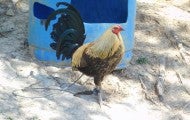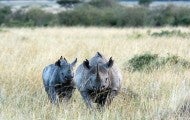Recently, the United Nations identified some of the top drivers of zoonotic diseases, like COVID-19, that spread from animals to humans. Not surprisingly, the top three factors specified align exactly with issues the Humane Society family of organizations named in May in our own global policy plan...
When a strain of bird flu sweeps through factory farms, where birds are tightly confined, the current “solution” involves immense cruelty. This is why it’s a genuine milestone in the fight against factory farming that the Humane Society of the United States, Farm Sanctuary and Mercy For Animals just...
Nevada Gov. Steve Sisolak just signed a bill into law making Nevada the ninth state to ban the sale of eggs that come from hens in cages. The measure also bans the cage confinement of egg-laying hens in the state. Most hens used in the egg industry are confined to barren, wire cages called battery...
Brazil this week announced sweeping changes to its requirements for animal testing of agricultural pesticides, including eliminating the requirement for a controversial one-year toxicity test conducted on dogs. The move will potentially spare the lives of tens of thousands of animals used each year...
Colorado has just banned cages for egg-laying chickens and will require that eggs produced and sold in the state be cage-free. The bill, which passed both chambers of the state legislature in June, was signed moments ago by Gov. Jared Polis. The new law will spare approximately six million chickens...
By Kitty Block and Sara Amundson The federal government has filed a brief strongly defending a law that would expand the ban on cockfighting in the United States to Puerto Rico, Guam and other U.S. territories. Cockfighters seeking to overturn the ban have challenged it in federal court, claiming it...
The nation’s most authoritative voice on infectious diseases today sounded a stern warning about the dangers of the wildlife trade and its relationship to pandemic diseases like COVID-19. In an interview with Fox News, Dr. Anthony S. Fauci called for the global community to pressure China and other...
We have just secured another monumental win for hens confined in tiny cages in the egg industry. Moments ago, Oregon Governor Kate Brown signed legislation championed by the HSUS to require all eggs produced or sold in her state to come from cage-free facilities. With Oregon’s new law, the entire...
In a victory that will likely prevent significant suffering for millions of farm animals, the Supreme Court today snuffed out efforts by the factory farming lobby and associated interests to overturn landmark laws against cage confinement in California and Massachusetts, and a California ban on the...
The U.S. House has just approved provisions that would make highways safer for wildlife to cross and create safer conditions to transport horses across the country, as part of the Moving Forward Act, a package of reforms designed to restore America’s aging infrastructure. The measures approved today...
By Kitty Block and Sara Amundson Slaughterhouses in the United States are already allowed to kill pigs at a lightning speed of up to 1,106 animals per hour. Under a new federal rule announced today, some of these facilities can dial up those speeds even further, with no limit whatsoever, creating an...
Animals are on a winning streak. Over just the last two days, we’ve had four terrific victories in U.S. federal courts that pave the way for progress for millions of animals. These include wildlife in the United States and overseas most often targeted by trophy hunters, animals in the fur industry...
Today, the U.S. Fish and Wildlife Service announced it will be proposing a rule that would ban predator control on the National Wildlife Refuge System. When finalized, this rule will be a huge victory for countless wildlife living on refuges. The National Wildlife Refuge System is home to thousands...
Breaking: We’re asking the SEC to investigate world's largest meat company's animal welfare promises
Today, we filed a complaint with the U.S. Securities and Exchange Commission against the largest meat and poultry company in the world, JBS and its subsidiary, Pilgrim’s Pride. Together with the Center for Biological Diversity, and in partnership with the Farmed Animal Advocacy Clinic at Vermont Law and Graduate School, we allege that these companies are misleading investors about how they treat animals and about their climate and environmental impacts.

















